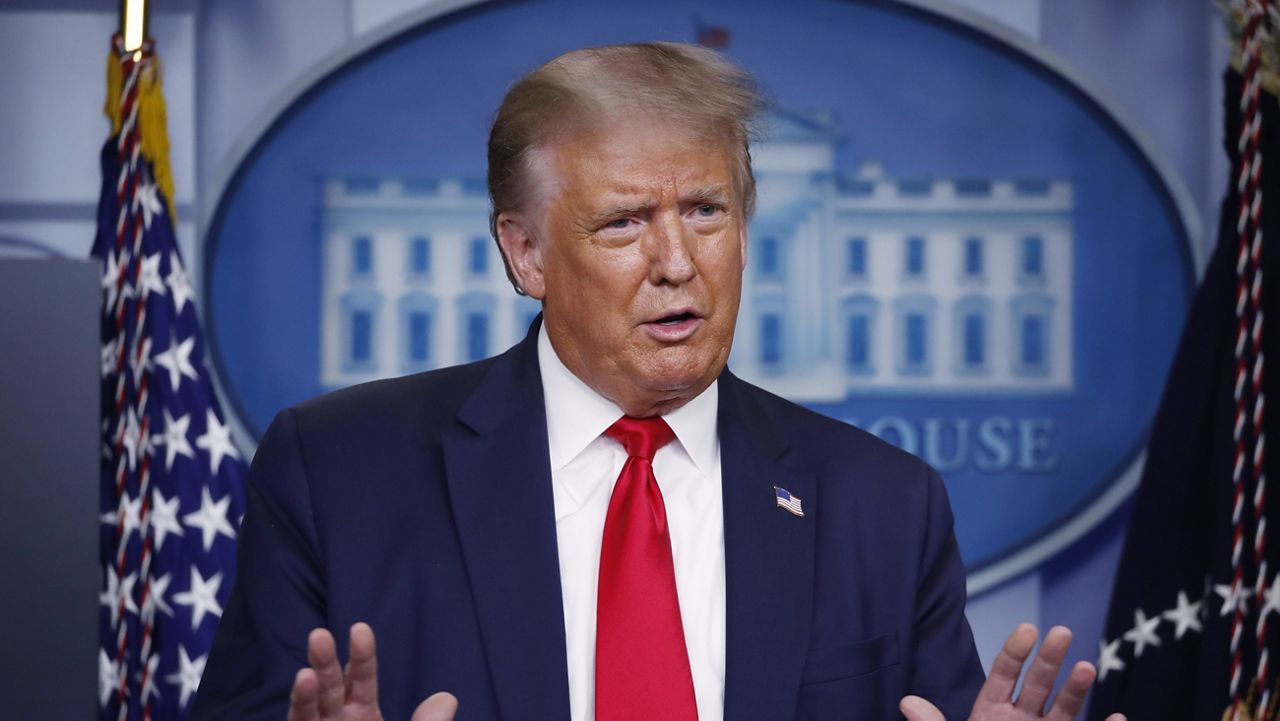NEW YORK — TikTok responded to President Donald Trump's executive order banning the app from operating in the U.S., saying they are "shocked" by the action.
What You Need To Know
- President Trump issued executive orders banning TikTok and WeChat from operating in the U.S. in 45 days
- Trump had threatened a deadline of Sept. 15 to “close down” TikTok unless Microsoft or “somebody else” bought it
- TikTok statement: "We are shocked by the recent Executive Order, which was issued without any due process."
- Popular video games "Fortnite" and "League of Legends" will not be impacted, per the LA Times
President Trump on Thursday ordered a sweeping but unspecified ban on dealings with the Chinese owners of consumer apps TikTok and WeChat, although it remains unclear if he has the legal authority to actually ban the apps from the U.S.
"For nearly a year, we have sought to engage with the US government in good faith to provide a constructive solution to the concerns that have been expressed," TikTok company said in a statement. "What we encountered instead was that the Administration paid no attention to facts, dictated terms of an agreement without going through standard legal processes, and tried to insert itself into negotiations between private businesses."
The twin executive orders — one for each app — take effect in 45 days. They call on the Commerce Secretary to define the banned dealings by that time. While the wording of the orders is vague, some experts said it appears intended to bar the popular apps from the Apple and Google app stores, which could effectively remove them from distribution in the U.S.
"This Executive Order risks undermining global businesses' trust in the United States' commitment to the rule of law, which has served as a magnet for investment and spurred decades of American economic growth," TikTok said, adding that, "it sets a dangerous precedent for the concept of free expression and open markets."
TikTok said they plan to challenge the orders: "We will pursue all remedies available to us in order to ensure that the rule of law is not discarded and that our company and our users are treated fairly – if not by the Administration, then by the US courts."
Trump’s orders cited legal authority from the International Emergency Economic Powers Act and the National Emergencies Act.
The Trump administration has railed against the threat from China, and both Republican and Democratic lawmakers have also raised concerns about TikTok, including censorship, misinformation campaigns, the safety of user data and children’s privacy. But the administration has provided no specific evidence that TikTok has made U.S. users’ data available to the Chinese government. Instead, officials point to the hypothetical threat that lies in the Chinese government’s ability to demand cooperation from Chinese companies.
Earlier in the week, Trump threatened a deadline of Sept. 15 to “close down” TikTok unless Microsoft or another company acquires it. On Wednesday, U.S. Secretary of State Mike Pompeo announced an expansion of the U.S. crackdown on Chinese technology to include barring Chinese apps from U.S. app stores, citing alleged security threats and calling out TikTok and WeChat by name.
Microsoft had no immediate replies to queries and Tencent declined to comment, according to the Associated Press.
Leading mobile security experts say TikTok is no more intrusive in its harvesting of user data and monitoring of user activity than U.S. apps owned by Facebook and Google.
“I am the first to yell from the rooftops when there is a glaring privacy issue somewhere. But we just have not found anything we could call a smoking gun in TikTok,” mobile security expert Will Strafach told The Associated Press last month after examining the app. Strafach is CEO of Guardian, which provides a firewall for Apple devices.
The order doesn't seem to ban Americans from using TikTok, said Kirsten Martin, a professor of technology ethics at the University of Notre Dame. She added that such an order would be nearly impossible to enforce in the first place.
“If goal is to get teenagers to stop using TikTok, I’m not sure an executive order will stop them,” she said. “Every teenager knows how to use a VPN (a virtual private network). They will just pretend they are in Canada.”
TikTok is a video-sharing app that's widely popular among young people in the U.S. and elsewhere. It is owned by the Chinese company ByteDance, which operates a separate version for the Chinese market. TikTok insists it does not store U.S. user information in China and would not share it with the Chinese government.
TikTok says it has 100 million U.S. users and hundreds of millions globally. According to research firm App Annie, TikTok saw 50 million weekly active users in the U.S. during the week of July 19, the latest available figure. That's up 75% from the first week of the year.
WeChat and its sister app Weixin in China are hugely popular messaging apps; many Chinese expatriates use WeChat to stay in touch with friends and family back home. WeChat also says it doesn’t share data with the Chinese government and never has, and does not store international user data in China. U.S. user data is stored in Canada.
A White House official told the Los Angeles Times Thursday that the executive order does not include video games companies owned by Tencent, so popular games such as "Fortnite" and "League of Legends" will not be impacted.
The Associated Press contributed to this report.



